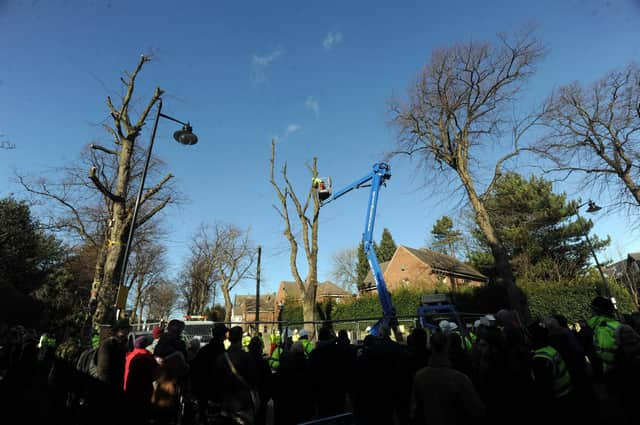Sheffield Council misled two judges over tree-felling 'strategy' - this is what happened


Sir Mark Lowcock’s inquiry into the city’s Streets Ahead tree-felling programme said the courts had been “misled on two occasions” in regard to its published ‘five-year tree management strategy’ document.
Contractor Amey had first created an internal version of the strategy in 2012 and in January 2016 the council published a public version with new additions - including a series of 25 alternative options that it said would be considered before a tree was removed.
Advertisement
Hide AdAdvertisement
Hide AdThe inquiry said Amey “expressed reservations” about it being released as their document when the council had amended it and asked that six of the options be removed from the list, as they were either not suitable or not allowable within the contract or more broadly in the UK highways sector.
But rather than removing them, the document was rebranded as a Streets Ahead product rather than an Amey one. A judicial review of the felling programme was launched by campaigners in February 2016, with the judge in the case ultimately ruling against the legal action and citing the strategy as an “important document”.
The inquiry report states: “It is clear from the judgement that Mr Justice Gilbart understood the Council’s January 2016 version put to him in the campaigners’ evidence to be an accurate representation of Council policy.”
An Independent Tree Panel (ITP) set up by the council also used the document in making their recommendations – with its members unaware that the ‘solutions’ had no contractual basis.
Advertisement
Hide AdAdvertisement
Hide Ad“They had made a significant number of recommendations based on the incorrect position they had understood from the Council’s January 2016 version of the Five Year Tree Management Strategy,” the report states.
“Combined with the comments from Amey before publication (in January 2016), the Inquiry considers that at least some Council officers were aware that the list of engineering solutions in the January 2016 version of the document was inaccurate.”
In later 2016, Amey told the ITP that the listed 25 alternative solutions were “not an accurate representation of their contract” - stating only two would be used regularly and many were either only short-term options or entirely unsuitable.
As the dispute continued, the council successfully sought an injunction against protesters in mid-2017 which referred to the judgement given in the 2016 judicial review.
Advertisement
Hide AdAdvertisement
Hide AdThe report said: “Based on the evidence provided to him, the judge (this time Mr Justice Males) again understood the Council’s January 2016 version of the strategy to be an accurate representation of the council’s policy and also quoted from it extensively in his judgement.”
The inquiry said the council had misled the ITP, the public and the courts.
The inquiry ruled that the council’s actions fit the category of “passively allowing the court to rely on something that is known to be false and not correcting the record”.
The report said: “While the council did not bring the strategy to the court as evidence themselves, they did not correct the record where it was given a false impression. In the judicial review proceedings, they did not clearly explain the nature of the document or the relationship between different versions. In the injunction hearings, they brought evidence relating to engineering solutions and relied on the judgement from the judicial review, without correcting the view taken on the Strategy in the judicial review.
Advertisement
Hide AdAdvertisement
Hide Ad“This also happened despite the Council as an organisation knowing that the position represented in the strategy was misleading.”
However, the inquiry report added that legal advice has suggested the omissions did not affect the outcomes of either court case.
The inquiry said the actions of the council were “unacceptable for a public body and it had a significant detrimental impact on the dispute”.